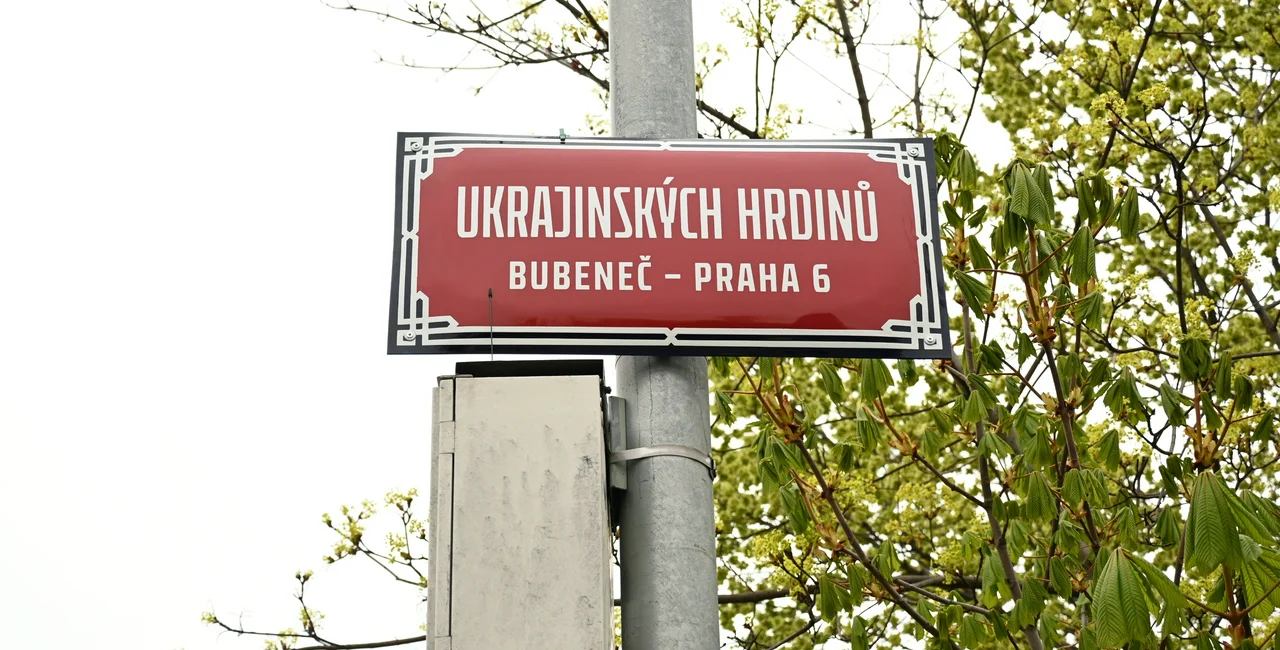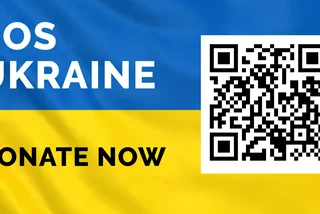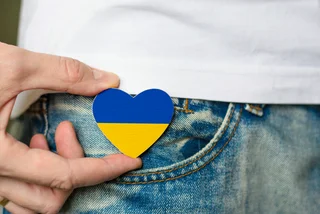April 24, 2022
The Czech Republic has frozen Russian property in its territory worth nearly one billion crowns, Finance Minister Zbyněk Stanjura said on Czech Television today. If the sale of this property is thought to potentially support the actions of Russia in Ukraine, it may even be confiscated in future, he added.
The Czech government is currently exploring avenues for confiscating the frozen property, and one of them is the passage of special laws, Stanjura said. Due to the war in Ukraine, EU countries have frozen property worth 900 billion crowns (37 billion euros) in total.
Freezing Russian-owned property is a part of the sanctions imposed on Russia for the invasion of Ukraine. The owners cannot do anything with the frozen property. EU Commissioner for Justice Didier Reynders recommended that the property be confiscated if the owners are connected with Vladimir Putin's regime or if they support the Russian war in Ukraine.
Czech Minister for Legislation Michal Šalomoun has said that special Czech sanctions would punish supporters of the Russian regime in in the Czech Republic more than the current EU sanctions, but they have yet to be approved.
April 23, 2023
Eight Czech regions, mostly in Moravia and eastern Bohemia, still have capacity to receive a large number of refugees and provide for them in the areas of housing, employment, and education, according to a study conducted by Charles University in collaboration with People in Need. In contrast, Prague, Karlovy Vary, and Plzeň are currently overburdened, the study reports.
The study recommends a redistribution of refugees across the country. A total of 156 municipalities in the Czech Republic have a population over 5,000 with access to assistance from authorities, more than 100 job openings, and available places in schools.
Since the start of the war in Ukraine, the Czech Ministry of the Interior has granted more than 305,000 special visas to Ukrainians fleeing their home country. About two-fifths of the refugees are children, and more than three-quarters of the adults are women.
Data za předchozà den 👇 pic.twitter.com/1n8LfVhqYW
— Ministerstvo vnitra (@vnitro) April 23, 2022
April 22, 2022
The Czech Republic has been providing heavy military equipment to Ukraine for several weeks, including tanks and artillery. Now, according to Czech server Echo24.cz, the latest deliveries likely include the self-propelled belt howitzers 2S1 Gvozdika. These Soviet mobile cannons were once used by the Czech army. Currently, the company Excalibur Army, which sold them to the Ukrainian army before the invasion, stores them in its warehouses. Trucks with covered military equipment heading for Ukraine seen in Olomouc this week are likely self-propelled Soviet howitzers 2S1 Gvozdika, probably bought from the arms company Excalibur Army, which belongs to the Czechoslovak Group.
Czech Foreign Minister Jan Lipavský spoke to CNN International Thursday, confirming that the Czech Republic would continue to send military support to Ukraine, despite a previous warning from Russia against supplying the country with Soviet weapons.
"We have realized that nothing is given. A comfortable life is not guaranteed. You have to fight for your freedom and independence and this is what the Czech society has learned."
— Czech MFA (@CzechMFA) April 22, 2022
🇨🇿 Minister @JanLipavsky for @cnni â¬‡ï¸ https://t.co/6cygs5CQzb
As of Thursday, Russian troops have occupied 42 villages in the Donetsk region in eastern Ukraine. Defending Ukrainian forces can regain them, Olena Symonenková, the adviser to the head of the Ukrainian presidential office, said on television. Meanwhile, Russian President Vladimir Putin has claimed victory in the biggest battle of the war, declaring the port city of Mariupol "liberated" following weeks of bombardment. Russia has also rejected a ceasefire proposal during the upcoming Orthodox Easter, Ukrainian President Volodymyr Zelensky said. Orthodox Christians celebrate Easter on April 24 this year.
More headlines
- POLL The Russian invasion is pushing Czechs West says a new poll conducted by the Psychological Institute of the Czech Academy of Sciences and Masaryk University in Brno. Respondents' attitude to Eastern culture and civilization has not worsened, but the predominantly negative attitudes toward Russians in the Czech Republic have cooled, even more, the pollsters said.
- EXCLUSION Russia and Belarus were not invited to annual commemorative events in Terezín and Lidice due to the continuing Russian invasion of Ukraine. The Terezin mourning ceremony will take place on the 77th anniversary of the liberation of the concentration camp on May 15. Organizers said the decision wasn't easy as the Red Army had liberated most of the Czech Republic from the Nazi occupation.
- AID The Czech Republic and another eight countries most hit by the refugee crisis will ask the European Commission for financial help due to the war conflict. By the end of April, they will present the proposal of 14 measures that are to help address the needs of the individual countries. The aim is to provide efficient use of the existing and subsequent European sources. The proposal was prepared jointly by the Visegrad Four (Czech Republic, Slovakia, Hungary, and Poland) as well as Bulgaria, Romania, and the Baltic countries.
- BORDERS The Transcarpathian region, in the west of Ukraine near the Slovak border, sounded warning sirens early Thursday evening, according to a video shared on Twitter last night. The danger has reportedly passed.
- RENAMED A section of Prague's Korunovacni Street, near the Russian embassy seat, which the City Hall has renamed Ukrainian Heroes Street, saw the new nameplates unveiled by representatives of the city, Ukrainian ambassador Yevhen Perebyinis and other foreign diplomats today. The unveiling ceremony was also attended by representatives of the embassies of Lithuania, Latvia, Estonia, Slovakia, and Poland.
Від Ñьогодні офіційно.
— UKR Embassy in CZE (@UKRinCZE) April 22, 2022
поÑольÑтво Ñ– конÑульÑтво рф у Празі знаходÑÑ‚ÑŒÑÑ Ð½Ð° вулиці УкраїнÑьких Героїв Ð±Ñ–Ð»Ñ Ð¼Ð¾Ñту Ð’Ñ–Ñ‚Ð°Ð»Ñ–Ñ Ð¡ÐºÐ°ÐºÑƒÐ½Ð°.
Мер Праги Зденєк Гржіб, мер Праги 6 Ондржей Коларж Ñ– поÑол України в Чехії Євген ÐŸÐµÑ€ÐµÐ±Ð¸Ð¹Ð½Ñ–Ñ Ð²Ð·Ñли учаÑÑ‚ÑŒ у заміні таблиць на перейменованих об'єктах. pic.twitter.com/btbzDGBVLy
April 21, 2022
Czech-American tennis legend Martina Navrátilová has criticized Wimbledon's decision to exclude Russian and Belarusian players from this year's tennis grand slam. Ukrainian players have, on the other hand, supported the move. Yet Serbian star of the men's game Novak Djokovic also condemned the move, describing it as "crazy". Navrátilová said that "exclusion like this, through no fault of these players, is not the way to go. Tennis is such a democratic sport it is difficult when you see politics destroy it. On the women's side, practically 10 percent of the field is not allowed to play. This decision was made in a vacuum by the All England Club. I understand their predicament but I just don't think they're seeing the big picture in a more global way. But I am devastated by the decision, quite frankly."
As seen and heard on Andrew Marr Tonight @lbc https://t.co/79OavV3ptL
— Rob Burley (@RobBurl) April 20, 2022
- VISAS The number of visas granted by the Czech Republic to refugees fleeing war in Ukraine exceeded the 300,000 mark yesterday. The total is now 302,000, including 2,800 more visas issued on Wednesday alone.
- HOUSING Czech municipalities will be able to rent vacant social housing built with state support to refugees from Ukraine, on the basis of a change in regulations approved by the government yesterday. The change allows local authorities to sign lease agreements with refugees from Ukraine granted temporary protection in the Czech Republic. As such, refugees won't have to prove that they do not own property in Ukraine and they will not have to deposit money to secure the rent.
- BENEFITS In the first five days of a scheme providing an allowance to those hosting Ukrainian refugees for free, 16,406 people applied for the so-called solidarity contribution. Payments haven't yet started, though, with the Labor Office still processing applications. Those hosting refugees can apply for CZK 3,000 per refugee, up to a limit of CZK 12,000. Applications can be made on the Labor Office's website.
- FACEBOOK An analysis by the Institute for Strategic Dialogue found that social media posts casting doubt on evidence of war crimes in Bucha, Ukraine have been shared hundreds of thousands of times and the Czech Republic is one of the countries where such posts are most common. Other EU countries in which posts questioning Russian atrocities were common are Italy, Austria and Germany.
April 20, 2022
Czech arms companies will repair Ukrainian army combat vehicles damaged in the country's war in Russia. The first contract will be for the repair of T-64 tanks by firms from the Czechoslovak group, according to the Czech Ministry of Defense. The Czechoslovak Group and other Czech companies may also be called upon to repair BTR and BRDM wheeled armored vehicles. The Czech Republic has agreed to repair Ukrainian vehicles because along with Ukraine and Russia, these vehicles were also used by the Czech army as a former satellite state of the Soviet Union.
The🇨🇿Czech Ministry of Defense and its enterprises will help the🇺🇦Ukrainian side in servicing and repairing armored vehicles.https://t.co/VMvvltbMJb
— Euromaidan Press (@EuromaidanPress) April 20, 2022
- DIPLOMACY The former ambassador of China to the Czech Republic was invited to the Czech Foreign Ministry today to hear the Czech government's complaints about Chinese-Russian cooperation amid Russia's invasion of Ukraine. Huo Yuzhen is in Czechia as part of a Chinese delegation visiting a total of eight central and eastern European states.
- CYBERATTACK Pro-Russian hackers claim to have accessed some Czech websites, including Czech Railways, some airport systems and a civil service website operated by the Czech Interior Ministry. The Killnet hacker group claimed responsibility for the attacks, which have not yet caused any severe impacts, according to the National Agency for Cyber and Information Security.
- VISAS The Czech Republic has so far granted almost 300,000 visas to refugees fleeing the war in Ukraine, according to the Interior Ministry. Numbers of issued visas fell to around 1,000 a day over Easter but rose again on Tuesday to 3,449.
- REFUGEES A poll released by the STEM institute has found that seven out of ten Czechs think it right for the country to take in refugees fleeing war in Ukraine. Slightly more than half also said they are happy to take a hit to their usual living standards so that refugees can be helped. At the same time, 70 percent of Czechs are worried about the impact of refugees on the Czech social system, with a majority fearing an increase in unemployment and around half worried about a negative effect on societal cohesion. 42 percent of Czechs meanwhile believe the government's steps to help refugees to date have been excessive.
April 19, 2022
Aid Czech Republic is world's third-biggest humanitarian donor to Ukraine
The Office of the President of Ukraine has reported on the results of its Coordination Center for Humanitarian and Social Affairs, and found that the Czech Republic is the third-most-generous nation in the world when it comes to providing humanitarian aid to Ukraine.
Charitable assistance received for Ukraine from donors worldwide now totals over CZK 20 billion.
"They go mainly to the accounts of the UN and international humanitarian organizations. And they, in turn, send them to help our refugees in different countries," according to the head of the President's Office.
Eleven percent of the donated funds came from the Czech Republic. This is three percent more than the proportion donated by the United States, a country over thirty times larger by population size. Only the Netherlands (almost eighteen percent) and the United Kingdom (47 percent) have donated more.
The huge amount donated by British citizens and corporations includes contributions from the Royal Family, the British government, film, theater and music stars.
In the 50 days following the start of Russia's invasion, 270,000 tons of humanitarian aid were shipped to Ukraine. Aid is often sent to logistics centers on the country's borders with Poland, Hungary, Romania, Moldova and Slovakia. Over half of the cargo from abroad first makes its way to Lviv before being distributed where needed throughout the country.
Security Czech security services warn of Russian infiltration
The Czech secret services have warned about the possibility for Russia to use the Ukrainian refugee crisis as a way of infiltrating the Czech Republic and wider European society.
The head of the BIS counter-intelligence service Michal Koudelka warned a Current Security Threats meeting in the Czech parliament that "the activity of Russian supporters in our country is slowly beginning to grow. We must be prepared for new attacks, including massive misinformation, the use of the 'fifth column' and cyberattacks."
The 'fifth column' referred to by Koudelka means a minority group trying to undermine the actions of the majority in favor of a hostile power. It's feared Russia will try to foster and enhance this disruptive internal threat by sending spies with fake documentation to the Czech Republic disguised as Ukrainian refugees. It's also suspected that misinformation will be used to create groups in Czechia who oppose the reception of refugees or the West's actions against Russia in the war in Ukraine.
A source from Czech security services told iDNES that "Czechia will play a strategic role in building another network of spies and Russian informants" in Europe. The Czech authorities have not yet identified any Russian agent among the hundreds of thousands of Ukrainian refugees who have so far entered the country.
Poll Was it right to sack a Prague teacher spreading Russian propaganda?
A teacher at a Prague primary school was sacked before Easter for relating false information about the war in Ukraine to her pupils.
The teacher claimed that "nothing is happening" in Kyiv, and that Czech Television, which controls footage from the Ukrainian capital, "is linked to billionaire Soros." The teacher was referring to George Soros, the Hungarian-American billionaire who conspiracy theorists often accuse of manipulating global media narratives.
Students at the school secretly filmed the 18-minute diatribe and showed the recording to the headteacher, who decided to suspend the teacher and wants to terminate her employment.
Education Minister Petr Gazdík praised the principal's quick and strong response to the incident. "Everyone has the right to an opinion, but not to lie," Gazdík said.
The teacher in question has portrayed her suspension as "a denial of democratic principles and freedoms." It's been claimed her speech in support of Russia was made while a Ukrainian refugee child was sitting in the classroom.
Do you agree with the suspension and probable dismissal of the teacher spreading Russian propaganda in the classroom?
Other news
- VISAS The Czech Republic has granted emergency visas to 295,616 refugees from Ukraine since the war began. 772 were granted on Easter Monday, with the holiday likely responsible for a sharp week-on-week decrease.
- AID Czechs have collected a total of around CZK 3.4 billion in aid for Ukraine since the country was invaded by Russia on Feb. 24. About one-third of the total sum was sent to an account for military purchases set up by the Ukrainian embassy in Prague. Almost CZK 1.76 billion has meanwhile been collected by the People In Need charity.
- EMPLOYMENT The Association of Small and Medium-sized Enterprises and Self-Employed Persons has predicted that the gastronomy sector could employ 10,000 to 15,000 Ukrainian refugees. The association criticized the failure of refugee assistance systems to inform refugees about their employment opportunities in the sector.
- DIPLOMACY Czech news sites are claiming that Tomáš Hart, the Czech diplomat expelled from Russia last week, was unsuccessfully tapped up by the Russian authorities as a potential informant. It's claimed the former deputy ambassador to Moscow, as well as another Czech diplomat, were contacted as potential secret service recruits, although the seriousness of the offer of cooperation is unknown.
Data za pondělà 18. dubna 👇 pic.twitter.com/vhxMCv9non
— Ministerstvo vnitra (@vnitro) April 19, 2022












 Reading time: 11 minutes
Reading time: 11 minutes 


 English
(Proficient)
English
(Proficient)






























